.
Nebraska, my tennis shoes with no socks.
The porch light is left on, always. The deep ravines
are feathers. McCook. The river. Kearney.
The feathers that are ravines.
McCook, then Kearney. Then Hastings.
Further from the river. The feathers, the sand.
This is where the railroads crossed.
I wish I knew more. Sand-lined river.
Everywhere we lived
my grandfather was lying down flat there.
He was a bear in the Alaskan Wilderness.
He was a salmon.
I wish I knew more. This park.
There’s the lawn mower. It looks like
A small tractor. The utility plant.
There are the unreachable men.
This rich plain. The robins glimmer
on the lawn. In the grass. There are no places
in this history where my grandma doesn’t pretend
nothing has happened. My cousin’s breasts
look just like my grandma’s. I am burning
in the Nebraska sun. I think I feel the prairie.

Dismal River, Nebraska Sandhills. Taken while on the river sampling for the plains topminnow: photo by Lindsay Vivian / USFWS, 28 October 2011

Nebraska Sandhills, Hooker County #1. Seen from Nebraska Highway 97 south of the Dismal River: photo by Ammodramus, 12 October 2010

Nebraska Sandhills, Hooker County #2. Seen from Nebraska Highway 97 south of the Dismal River: photo by Ammodramus, 12 October 2010
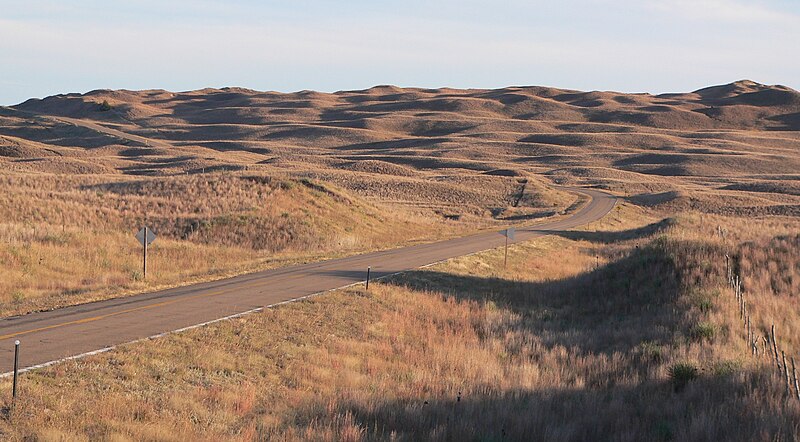
Nebraska Sandhills, Hooker County #3. Seen from Nebraska Highway 97 south of the Dismal River: photo by Ammodramus, 12 October 2010
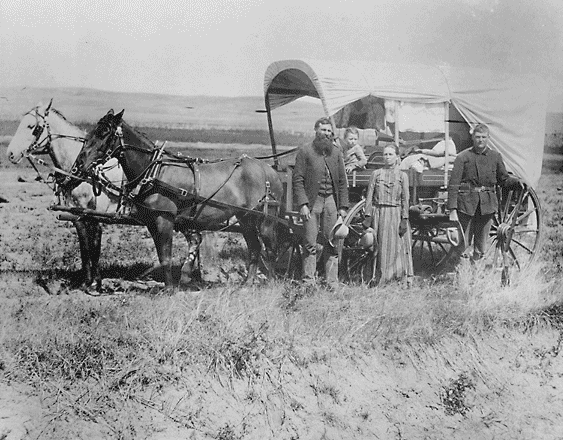
"The Covered Wagon of the Great Western Migration. 1886 in Loup Valley, Nebraska." A family poses with the wagon in which they live and travel daily during their pursuit of a homestead: photographer unknown, 1886 (National Archives and Records Administration)
"Parade of U.S. Infantry through Kearney, Nebraska, 1888": photo by U.S. War Department. 1888 (National Archives and Records Administration)
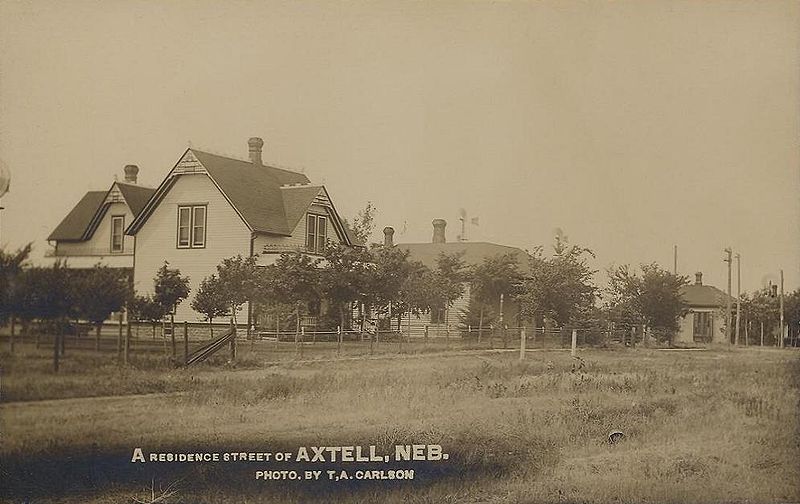
A residential street of Axtell, Nebraska: photo from an original postcard published by T. A. Carlson, c. 1908 (National Archives and Records Administration)
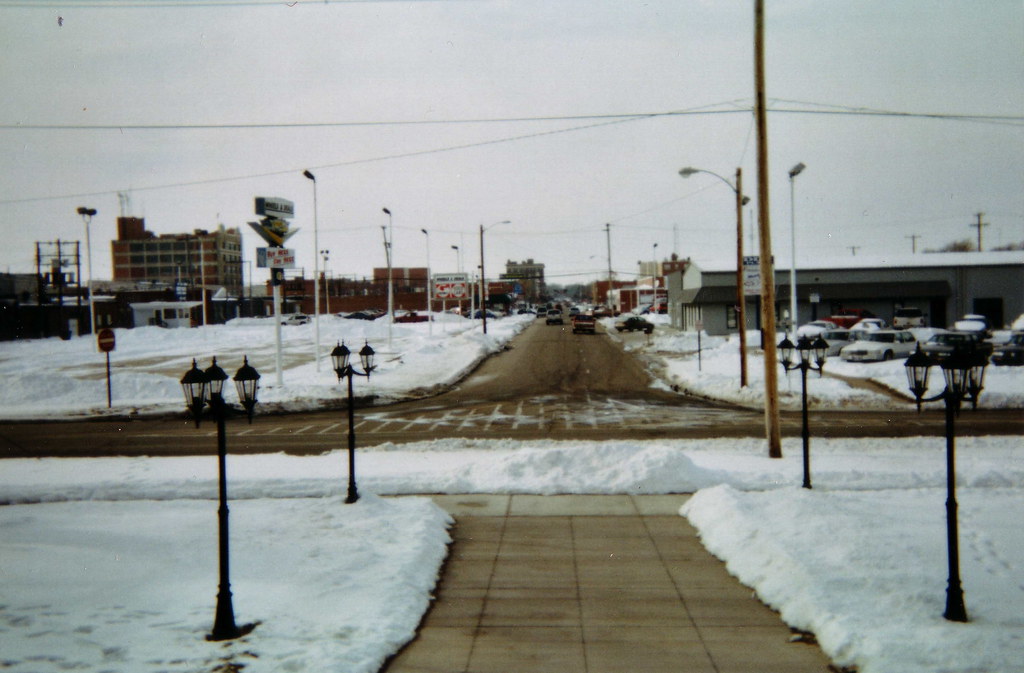
Outside a Mexican restaurant, Hastings, Nebraska: photo by Chris Ford, 9 February 2008
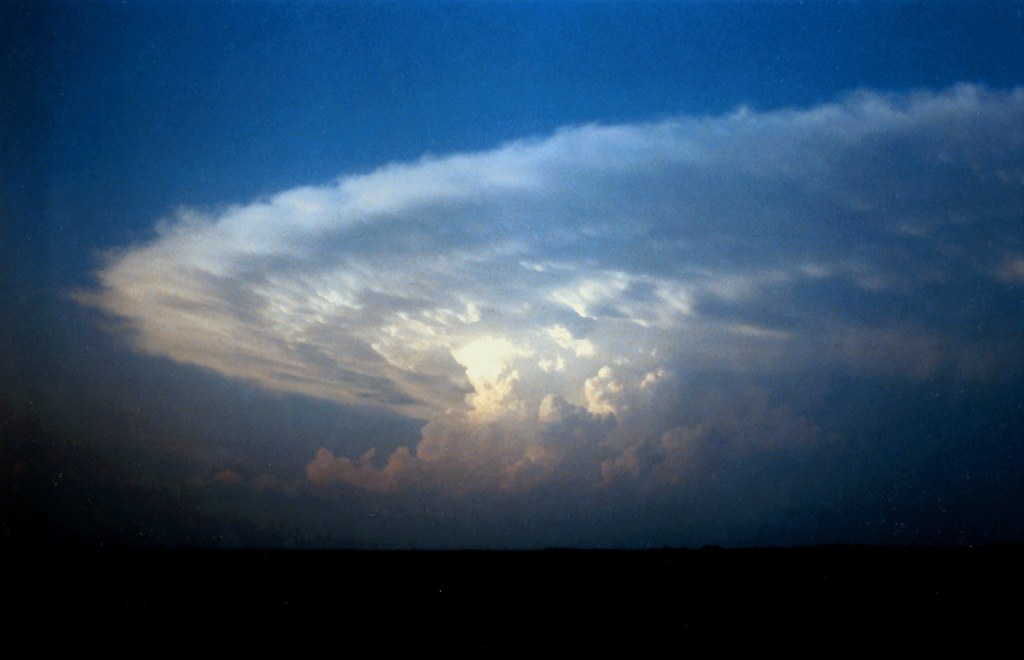
A magnificent supercell thunderstorm cloud formation, Humboldt, Nebraska, 20 April 1985: photo by Stephen Corfidi, NOAA/NWS/SPC/OB (NOAA Photo Library)
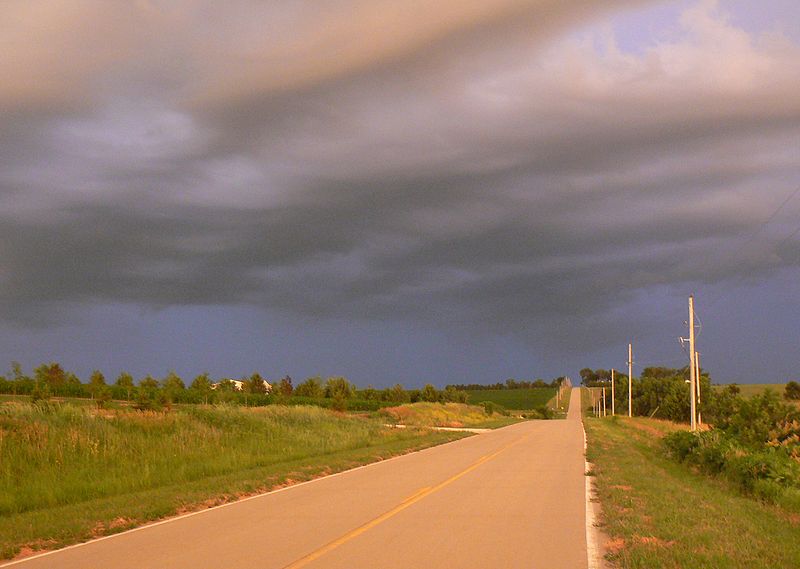
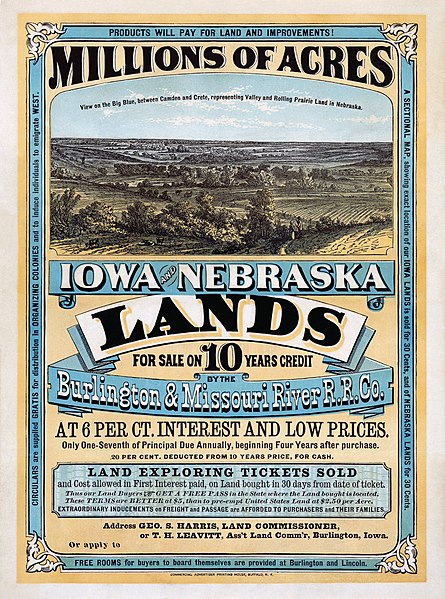


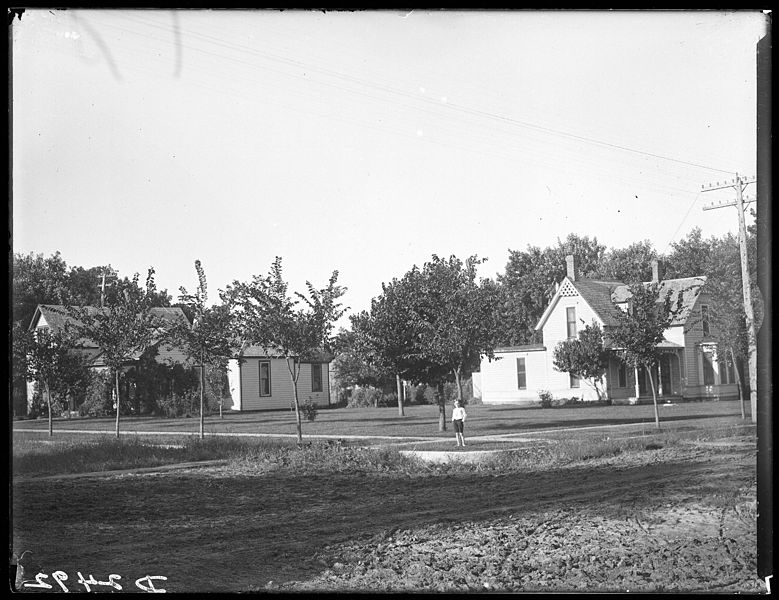

i don't know how i'd be able to be in a place so flat.
ReplyDeleteFlat kind of grows on you, after a while. The large sky, the waving grass, the infinite horizons. And then after another while, you want to run...
ReplyDeleteBut what I really want to know is: what the heck was the U.S. Navy doing in Hastings, Nebraska in 1944?
Eating "tamalies"??
Susan's poem brought back memories of our own period of habitation (late 70s) in that flat wide lonesome stretch of planet.
ReplyDeleteMeanings of the Plains.
The Plains
ReplyDeletethe Buddha ground:
the prairie grass once so high, the ground so flat
that a man on horseback
riding off into the curving distance
would quickly disappear from sight.
Topsoil there
in central Illinois
so they tell me
is eighteen feet thick.
you mean inches . . .
eighteen inches.
No.
Feet.
Marshland once
until the Dutchmen came and drained it
a skill learned on the Zuider Zee.
Black all the way down
rich earth
you wouldn’t believe
throw down seeds
they grow.
Love the way that the poem twists and turns through the flat lanscape.
ReplyDeleteWe've been to the fens near Peterborough, visiting the inlaws. It's a strange place with skies that leave you feeling invisible and alive. But I'm like you, V: I don't know whether flat would suit me as a long term proposition.
ReplyDelete"There are no places/ in this history where my grandma doesn’t pretend/ nothing has happened.
This line, between a here and a there, crackles, and the static coming off it throws me back.
Thanks for the comments and for posting this poem. I look at it and want to run into the arms of the buffalo grass, search for the hoofprints of the others.
ReplyDeleteBeast of Burden
ReplyDeleteMy toe, my beast, it lifts up a cat, a flat of cauliflower.
I’ve never had a Minneapolis dream, but isn’t that where
Prairie Home Companion steps in, isn’t that what happens
here, in a way, in the highlight, in the heavy load
ox-like, of work, the mind gathering, the plowing
planting and watering, all along, the tip toeing around—
it is almost a sort of tameness
was once a wild thing, once an involved
pose, those things needed, necessary.
Their state, their hair and the way the lookism—
o.k., the looks and looking. How it changes,
it is all along and a spreading, growing.
They still thought
ReplyDeleteThere was gold out in the
Far reaches of this country,
The Staked Plains, the region
Of Quivira, they had their
Suspicions and were somewhat
Mystified—there was gold somewhere
Because “they knew what the thing was
And had a name for it—acochis—“
The store isn’t a 7-11 but
It used to be a gas station
Now it’s only a store
Minus the pumps.
Pedro de Casteneda
Tells about the monstrous cows encountered
Bulls he calls them.
There are postcards
of Canada and Alaska
right beside the packages
of gold tinsel
I had to run to the store for.
There are greetings
written in cursive
on the fronts
of all the postcards.
The cards shine lime green,
velvet brown, they shimmer
on the rack.
Hazen, I love your poem. I can smell the black soil. I can smell the Pleistocene retreating.
ReplyDelete"the front range with the sun going down behind it"
ReplyDeleteThat is what happens there on the High Plains.
I love Tom Clark's poem, "Meanings of the Plains" where there is the red coke dispenser, the sun going down with so much meaning that nobody could possibly understand.
I chew, but cannot swallow
ReplyDeletethis metal spaghetti
as it flows from my mouth—
drags, sounding like the
clatter of shells
across the linoleum—
cracks and spaces filled with
grease mixed with dust—
I grab hearty handfuls,
plastering the tangled tinsel
onto my head
for hair
and look around the store
for a package of barretts
that will manage & control
my new mane. My eyes wide
open and I crunch my torso
first to the left and then
to the right—
my head swings and follows,
my legs twitch,
I make my way up the aisle,
almost stepping in a soft
round plate of steaming dung.
There’s time to chew
on the tinsel.
It could have been cooked
a little longer,
served al dente.
“There is sort of a girdle
round the middle of the body.
The hair is very wooly, like
A sheep, very fine, and in
Front of the girdle the hair
Is very long and rough like
A lion’s.”
Thanks for the comments Mr. Chant and Mr. Wooden Boy.
ReplyDeleteThe High Plains Whirl
ReplyDeletePawnee Buttes.
The sandy clay
spells out firmness—
it blows softly
towards the cactus.
I hope you don’t become
a strand of this cactus grass—
the wind is howling
I am spinning
with my hands out
fingers reaching to pull you in
from all directions.
There are green flames.
The trees are not just dead earth.
Missouri
ReplyDeleteIt is cool, a small ditch
under some cedar hedges next to the house.
Nobody knows I’m there—this is where
the sour grass grows
that I eat. It is tangy and I see
sparks fly out of my brain
when I shut my eyes.
Later, when we moved to Nome,
it was a place similar
but stuck on the side of a hill—
Chicken Hill—where burrowing owls
hunted at night and their wings
brushed the tundra air right above
where I lay, waiting for the sun
to go down—of course it never did,
or for our dog Shumagin
to come find me, bring me home
to our house across the creek
where I wrote my own Nancy Drews
in shadow writing
listening again
for the gunshot from the neighbor
woman—a suicide,
and listening again for our baby sitter’s
drunk boyfriend snoring on the couch
or for Mr. Peterson to come
give me more 8 track tapes.
For Cathy Cabinboy’s mom to unfreeze,
for Deena’s brother to empty the water
from his hip waders in the Kusitrin River,
for little Rena to not be run over
by the snowplow.
I am waiting,
waiting in the bedroom in Missouri
someone’s house where we stayed over
and I drew on all the freshly painted walls—
I am waiting, waiting for the animals
I drew to guide me, take me to a land
where we all speak the same language,
where their cries and calls form music
that’s perfect, that’s enough as it is.
What I Learned
ReplyDeleteCall it the feral island of blind foxes
and wrap-around moon.
In the tall grasses my dreams wait crouching.
Wishes easily flushed
into the pink and grey wind.
Call it just plain walking.
Every step leads away from
and closer to the ocean
up on the bluffs. The bluffs took giant steps
and the ocean marched gently, always.
In the middle of the caliche forest
I found some of my friends
covered in strange chalk.
I did not shake their hands.
At Night (The Leaves Are Soft)
ReplyDeleteThe moon is my friend
coated with feathers.
That’s how I always wear my hair
in Nebraska.
like it’s dropped down from the air.
The mashed potatoes in Nebraska
are like mountains. Forks climb
to the tops and butter avalanches
down to the small villages
next to the canned peas.
next to the gravy.
Everything is near the meat.
My Father Wanted The West
ReplyDeleteWhen he was little he got cowboys
and Indians and also a boy
with a moon for a head,
pineapple spikes for hair.
He wanted joy and sustained surprise.
That’s what he got
with Moon Boy just by taking a look.
This made sense. My father,
showing his teeth, genuine agates.
His hair, wild, scraggly oaks
and smooth corn husks. A scent
rising off his clothes like buckskin
and eagle feathers in the fancy dance
he did across the country.
It wasn’t as if he were lazy
but he wanted the West to come
to him, only, instead, it passed
through him and out the other side—
through his body towards my mom, me,
and my sisters swirling like satellites
around a heavenly body.
Winter Solstice
ReplyDeleteNo water, yet we were his crew,
Sighting land for him. Land ho! (Nevada)
Land ho! (Montana) Land ho! (Oregon).
We were sturdy and had sea legs.
Ate sardines, Pilot Bread, astronaut food.
Army surplus rations and freeze-dried
ice-cream from a can. We’d show off
to our friends—hey, want a bowl of ice cream?
and we’d come out with a bowl of pink or white
marshmallow-like rocks that stuck
to your teeth after one bite.
The getting ready! Our little metal trunks
held all the toys and books for the next place.
My dad’s beard, his sunglasses. The real boat
he had once in Missouri and how he drove it
round and around in circles on a lake.
Plus, the great trip he took to Mexico
with his brother to the Sea of Cortez
& how they swam in the phosphorescent water
& the raft trips when I was in high school
& how Mom fell for the leader, John,
a math professor, good with ropes.
Oh, the sailing trips along the Oregon Coast
and to Alaska. How my mom hated it
being stuck on a boat. How it was alright too
because by then it did not matter.
The Echo (While I’m Swimming)
ReplyDeleteIt is summer. The wind is wild
in the trees and in the bushes.
I spot the places.
My mother yodels on the bank
of Dismal River. The song is partly
about a well in a village near
a certain mountain. There is wine
and also a small bird.
I see my mother’s long white
foot touch the water. Everything
is alive in the river.
She watches me swim and sings
mostly to listen for the echo.
Her face is expressionless
as she concentrates on
throwing her voice up to the roof
of her mouth.
i've grown attached to my mountains. mountains make a valley. but honestly, never been anywhere flat. nope, never yet.
ReplyDeleteGrowing up in a place where an anthill would have passed for a mountain, the mere thought of peaks and valleys was enough to excite my imagination. There was a certain city street I liked because of the way cloud banks stacked up at one end of it. It was possible to close one eye, tilt the head a bit and imagine... mountain ranges.
ReplyDeleteThen came later years of living in mountains on several continents, and having to be walking up them.
And then still later came living in very high mountains, over 10,000 feet, up near where they made The Shining. And that was pristine and strange and in mid of winter (all eight months of it) weirdly spooky and deathlike.
Unidentified flying objects and light shows traversed the night skies.
Northern lights? Exploding propane tanks in liftoff?
Before we migrated up there from CA. (some 34 years ago now) the local acid shamaness approached me one day and said in a low voice, ominously and with curious dark portent, "Never move from a temperate zone to a high altitude".
I took that with a grain of nonchalance. (Always a bit dumb that way.)
Nebraska! My favorite Springsteen (next to "Trapped"). Fantastic collection of wonderfully vivid poems, Susan!
ReplyDeleteIowa is somewhat tamer, the railroad having breached it at least a decade sooner. Prairie to loess and plains.
http://en.wikipedia.org/wiki/Burlington_and_Missouri_River_Railroad
I gravitated to the nearest mountains most of my life. At fourteen sent letters to Esso etc. stating that I was planning a world-wide tour of mountainous regions, requesting maps. Got a big batch for "free". Ironically, my son has been the world traveller and National Park Ranger.
The sandhllls of Nebraska are really quite lovely - in an austere way. These photos and Susan's poem remind me of the rolling plains where land meets sky - a land that says "home."
ReplyDeleteI've become more fond of crows since I live and spend most of my time in their range yet seldom see a meadowlark. They, the crows, are not without their harriers, jays especially.
ReplyDeleteMarianne Moore's 9th Inning Pitch to the Dyslexic
A blessing to poets,
a blessing of poets.
Sing 'em, write 'em,
grow 'em poem.
Scratch the itch.
A thousand more
like it? Poet,
you're rich.
How rich?
Sing 'em, write 'em,
grow 'em poem.
It's too late to switch.
My apologies to Marianne Moore, whom I saw read her most famous and other wonderful poems at the 92nd St. Y.